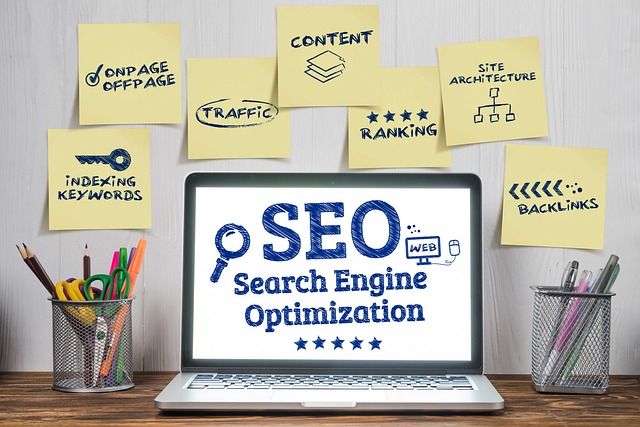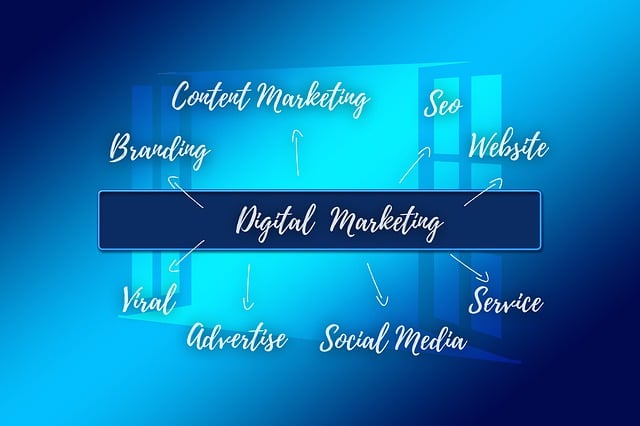Digital Marketing is a vital tool for global business success, leveraging online channels like search engines, social media, email, and websites. It combines creativity with technology, utilizing strategies such as SEO optimization, content creation, social media management, and analytics to boost engagement and conversions. The dynamic nature of the digital landscape demands adaptability due to technological advancements. Social media platforms foster community engagement, while SEO and Content Marketing work synergistically for online visibility. Email marketing builds customer relationships through personalized content. Data analytics provide strategic insights for campaign optimization and market adaptation. Ethical considerations, including privacy and transparency, are crucial for maintaining consumer trust in the digital era.
In today’s digital era, Digital Marketing has emerged as a game-changer for businesses worldwide. This comprehensive guide delves into the multifaceted world of professional digital marketing, offering a detailed exploration of its various facets. From understanding the core principles to leveraging powerful tools like social media, SEO, content marketing, and data analytics, each section provides valuable insights. Discover how successful campaigns are crafted, and learn about the ethical considerations shaping this dynamic field.
Understanding Digital Marketing: A Comprehensive Overview

In today’s digital era, understanding Digital Marketing is paramount for businesses aiming to thrive. It encompasses a wide range of strategies and tactics designed to promote products or services through digital channels such as search engines, social media, email, and websites. Unlike traditional marketing methods, digital marketing offers unparalleled reach, allowing businesses to connect with their target audience on a global scale. By leveraging data analytics, businesses can gain valuable insights into consumer behavior, enabling them to create highly targeted campaigns that drive conversions.
A comprehensive overview of Digital Marketing reveals a dynamic landscape where creativity meets technology. It involves crafting engaging content, optimizing online presence through search engine optimization (SEO), managing social media interactions, and utilizing email marketing effectively. Moreover, it includes pay-per-click advertising, influencer partnerships, and analytics to measure campaign performance. With constant evolution driven by technological advancements, staying informed and adaptable is crucial for marketers to stay ahead in the competitive digital space.
The Evolution of Digital Marketing Strategies

The digital landscape has witnessed a profound evolution in marketing strategies over the years, transforming the way businesses connect with their audiences. Traditional marketing methods have given way to a dynamic and ever-changing digital realm where consumers are no longer passive recipients of advertising but active participants in an online conversation. This shift has been propelled by advancements in technology, increased internet penetration, and a growing preference for digital channels among both businesses and consumers.
Digital Marketing strategies now leverage powerful tools such as search engine optimization (SEO), social media marketing, content creation, email campaigns, and analytics to drive engagement and conversions. With the ability to target specific demographics, track user behavior, and measure campaign effectiveness in real-time, marketers can craft more personalized and impactful messages. This evolution continues with emerging trends like artificial intelligence, augmented reality, and voice search, further blurring the lines between online and offline marketing experiences.
Key Components of a Successful Digital Marketing Campaign

A successful digital marketing campaign hinges on several key components that, when executed effectively, can drive significant results. Firstly, defining a clear and concise goal is essential. Whether it’s increasing brand awareness, generating leads, or boosting sales, a well-defined objective serves as the north star for your strategy. This is followed by understanding your target audience: their demographics, behaviors, and preferences. Crafting buyer personas allows you to tailor content and messaging that resonates deeply with your ideal customers.
Content creation plays a pivotal role too. High-quality, relevant, and engaging content not only attracts but also retains your audience. Integrate diverse formats like blogs, videos, infographics, and social media posts to capture attention and foster interactions. Additionally, search engine optimization (SEO) is crucial for enhancing online visibility. Optimizing web pages with strategic keywords and creating valuable backlinks can significantly improve your search rankings, driving organic traffic to your website.
Leveraging Social Media for Business Growth

In today’s digital era, leveraging social media platforms is a powerful strategy for business growth within the realm of digital marketing. These platforms offer a direct line to folks and foster a sense of community around brands, enabling companies to connect with their target audience in meaningful ways. By sharing engaging content, responding to customer inquiries, and analyzing user interactions, businesses can enhance their online presence and build brand loyalty.
Social media acts as a game-changer, revolutionizing the way companies interact with their customers. It allows for two-way communication, enabling brands to gather valuable insights into consumer preferences. Through targeted advertising and influencer partnerships, digital marketing strategies can reach a vast audience, driving traffic to websites and increasing sales prospects.
SEO and Content Marketing: Driving Organic Traffic

In the realm of Digital Marketing, Search Engine Optimization (SEO) and Content Marketing are two powerful strategies that work in harmony to drive organic traffic to websites. SEO involves optimizing a site’s content and structure to rank higher on search engine result pages (SERPs), making it easier for potential customers to find the business online. By understanding the intricacies of keyword research, on-page optimization, and link building, businesses can significantly improve their visibility and attract more relevant visitors.
Content Marketing, on the other hand, focuses on creating and distributing valuable, relevant content that engages and retains a clearly defined audience. This involves crafting compelling blogs, articles, videos, or infographics that not only inform but also entertain and educate. By consistently delivering high-quality content, businesses can establish themselves as thought leaders in their industry, fostering trust and loyalty among their target audience. The synergy between SEO and Content Marketing is undeniable; optimized content naturally attracts organic traffic, while effective SEO ensures that this valuable content reaches the right people at the right time.
Email Marketing: Building Long-Lasting Customer Relationships

In the realm of digital marketing, email remains a powerful tool for fostering meaningful connections with customers. Unlike fleeting social media trends, email offers a direct line to your audience, allowing for personalized and sustained engagement. By curating compelling content tailored to individual interests, businesses can cultivate loyalty and encourage repeat business. This strategy is particularly effective in building long-lasting customer relationships, as it treats subscribers as unique individuals rather than just another data point.
Effective email marketing involves segmenting recipients based on demographics, purchase history, or browsing behavior, enabling targeted messaging. Such precision ensures that each recipient receives valuable content relevant to their interests, enhancing the overall experience and increasing the likelihood of conversion. With consistent, well-timed communications, businesses can keep their brand top-of-mind, drive sales, and create a thriving community around their products or services in today’s digital era.
Data Analytics in Digital Marketing: Measuring Success

In the realm of digital marketing, data analytics is a game-changer that enables professionals to measure and optimize their campaigns with precision. By leveraging advanced tools and techniques, marketers can gain valuable insights into consumer behavior, preferences, and interactions with various online platforms. This involves tracking key metrics such as website traffic, conversion rates, customer demographics, and engagement levels across different channels like social media, email campaigns, and search engine optimizations. With these data points, businesses can make informed decisions to enhance their Digital Marketing strategies.
For instance, analyzing user behavior on an e-commerce site can reveal popular product categories, abandoned carts, and successful marketing touchpoints. This information is crucial for refining content, improving website design, and personalizing offers to increase sales and customer satisfaction. In essence, data analytics empowers digital marketers to assess the effectiveness of their efforts, identify areas for improvement, and adapt quickly to market changes, ensuring better ROI and sustained success in a dynamic Digital Marketing landscape.
Ethical Considerations in Professional Digital Marketing

In the dynamic landscape of digital marketing, professionals must navigate a complex web of ethical considerations. As digital platforms become increasingly integrated into daily life, it’s crucial to ensure that marketing strategies respect user privacy, transparency, and consent. Missteps in these areas can lead to severe repercussions, including legal penalties and damaged brand reputations. Therefore, fostering a strong code of ethics within the digital marketing community is essential for sustainable growth and public trust.
One key aspect involves ensuring data privacy and security. Marketers must be transparent about how they collect, use, and store consumer information. This means clearly communicating data collection practices to users and obtaining explicit consent where necessary. Additionally, adhering to regional regulations like GDPR in Europe or CCPA in the US is vital to avoid legal pitfalls. By prioritizing ethical conduct, digital marketers can build trust with their audience and position themselves as responsible stewards of consumer data.
